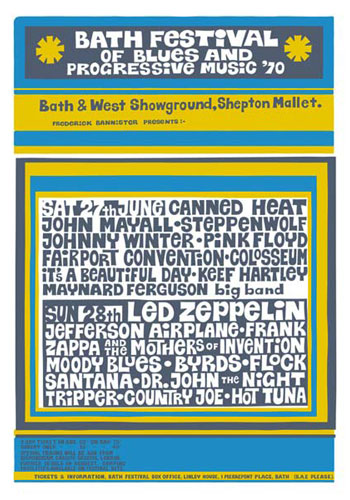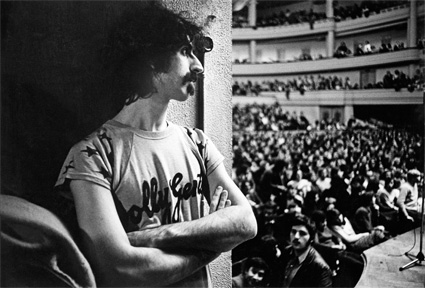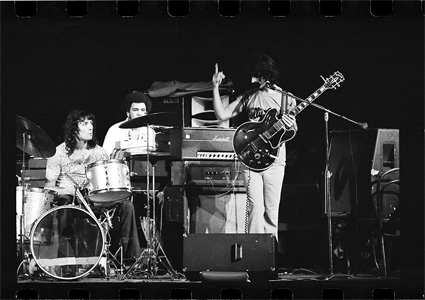January, 1970—FZ In Europe
70/01, St. Tropez, France, Byblos Hotel
FZ jammed with Docda•l during MIDEM convention, which ran 01/16-01/23.
Aynsley Dunbar
[FZ had] been impressed by Aynsley [Dunbar] when they jammed at Amougjes; he reckoned his own playing "took off within a couple of bars". [Friends, July 10, 1970, "Hot Waxx!"] When Frank had been in London around Christmas-time, he'd tried to make contact with Aynsley, leaving messages for him at the Speakeasy. "When I rang him up, he offered me the job of playing with him," Aynsley said. "I turned it down because I had just formed Blue Whale but I thought about it and a week later accepted. It was only after very careful consideration and thought that I decided to join." [No Commercial Potential (E.P. Dutton & Co. Inc., 1972)]
[Aynsley Dunbar Retaliation] shared bill with Frank Zappa band in Belgium, in the Amougies Festival, in October 1969, and in Paris, where Zappa puts his eyes on Dunbar, and . . . soon after, Aynsley breaks the band to join him. Tommy [Eyre] was also offered the job in Mothers of Invention, but at the last minute Ian Underwood decided to stay, so Tommy didn't join.
He was also originally considered by Chas Chandler and Jimi Hendrix to play drums in the JH Experience. Chas and Jimi could'nt decide who to pick between Mitch Mitchell and AD. They tossed a coin and Mitch got the job.
Hot Rats Band/Chunga
I got interested in playing more guitar and that's when I started playing with the Hot Rats group. I wanted not just to play more guitar but play it in the context of a stronger rhythmic feeling. Because if there was one weak point in the old Mothers it was the rhythm section. It was too static.
In order to synchronize both drummers they had to be limited in the type of things they could play. So the beat stayed pretty monotonous. I heard Aynsley (Dunbar) play at this pop festival in Belgium and I really liked the way he played. So I brought him to the United States, in the first place to make a successor to the "Hot Rats" album which was what "Chunga's Revenge" turned out to be. And somewhere along the line all these other plans started popping up.
Pete Senoff, "Be Bop Alua," Sundial, April 3, 1970
While on the subject of Zappa, please note that his other new group is not called the Hot Rats any longer. Now they are CHUNGA. It's also the title of their next album, called Chunga's Revenge.
Isle Of Wight Festival
Frank Zappa may re-form his original Mothers Of Invention group for this year's Isle of Wight festival. [...] No further details could be obtained at press time, but it is understood that, if Ronald Foulk cannot clinch the Mothers' booking, he would welcome the appearance of Zappa's new group, Hot Rats, whose first album was voted MM LP Of The Month. [...] The line-up of Hot Rats includes British drummer Aynsley Dunbar, plus Zappa (lead guitar), Max Bennett (bass), Ian Underwood (keyboards and reeds) and Sugar Cane Harris (violin).
Aynsley Dunbar
GW One thing I had in mind was the period right after the Mothers disbanded, when you started doing heavy guitar solos like "Magic Fingers," on 200 Motels.
ZAPPA Well, the reason I was able to go in that direction was because of the drummer who was in the band at that time, Aynsley Dunbar. Remember, in the earlier Mothers of Invention we had an assortment of drummers who were okay for keeping a beat, but when I played a guitar solo with them, there wasn't much interaction. That changed with the arrival of Aynsley Dunbar, who played on 200 Motels. We used to sit here in my basement and jam. His drums were set up right over there and I had an amp here. We would play in the afternoon. But it's been a long time since I've known any drummers who just like to play drums in that way. You know, without looking at the clock and wondering when the next paycheck was arriving. That's pretty much a result of the Eighties, with everybody being career-oriented and so forth. The spirit of "let's just go play" died a long time ago. I don't expect that it's ever coming back.
Max Bennett
Max Bennett, interviewed by Alessandro Pizzin, c. 2007
Frank called me at home about 2 months after the [Hot Rats] recording dates and asked me to join his group. At first, I declined since I was so busy, however he said he would send me a copy of Hot Rats and asked to hold my final decision until I had heard the album. After I received the album, I was very pleased with the outcome and agreed to join the group. We played for several months in and around L.A. and rehearsed at nite.
[...] While I was in the band, I cannot remember any kind of conflict of a musical nature. I think that the Hot Rats band was as free and loose a band that Frank ever had.
[...] Gradually the music changed at rehearsals to the point that it was too avant garde for my tastes and taking up too much of my time so I had to leave the group.
I played some shows with him in L.A and San Diego. He was a great guy. I liked the first music we did with Hot Rats because it was more jazz type, you might say, where everybody was using their own input to make this thing happen. From what I understand, that album got the best reviews of any album he did. I got a call from Frank about a month or so after we did the album and he wanted to know if I could work with him, and I told him I didn't think I could because I was too busy working in the studios. And he said, well let me send you the album, and I'll call you back in a couple of weeks, so he sent it to me and I thought, wow, this looks like a lot of fun! So I started doing a few jobs in L.A with him and we started rehearsing at night, but I had to quit because I was just working too much. The band I played with was Ian Underwood, Sugarcane Harris, I can't remember who played drums at first. [ed. Wikipedia lists John Guerin as the other drummer.] Later on, Aynsley Dunbar joined us. And of course there was Frank himself. I know we worked the Olympic and several other places including some out of town jobs.
Frank was a real taskmaster. And then the rehearsals when we started involved a lot of reading and the music had a lot of super duper ethereal kinds of things and it's not my trip. I don't really enjoy that that much. I appreciate atonal music but it's not really my cup of tea. I wasn't all that comfortable doing it and I realized I didn't have the time either so I told him "Frank, I love the band but I can't do it anymore; I'm just too busy." I was playing till 1 o'clock in the morning in the studios and rehearsing from 1.30 to 4am and then having to get up and make an 8 o'clock call at Universal. I couldn't do it!
Later on, we started working on other stuff and it got highly complicated; it got to be too much. I'd get out of the studio at midnight, then go rehearse with him and his group from 1 o'clock in the morning. I had a great time, but I had to pass on it eventually.
Using studio musicians already in demand restricted the possibility of gigs further afield. So in April, Bennett was replaced by Jeff Simmons, who joined Ray Collins, Billy Mundi, George Duke and Aynsley Dunbar for a short US tour which ended at the Fillmore on April 19. After that, Frank disbanded them.
Sugar Cane Harris
Sugar Cane never did tour with us. He worked a couple of local jobs in Los Angeles.
Early 1970?—Thee Experience, Los Angeles, CA
Charles Ulrich, September 27, 2013
[Max] Bennett remembers playing a gig at a club on Sunset that he was pretty sure was Thee Experience. The line-up was Zappa/Underwood/Bennett/Greene, and this gig took place before the San Diego gig with the same line-up.
jozorama, eBay (quoted by Detlef Jürgens)
Hot Rats first pressing signed by Frank Zappa, Captain Beefheart, Ian Underwood, Sugarcane Harris, and Max Bennet. I had this album signed in 1970 at a small club in Hollywood, California named 'Thee Experience'. Zappa was a friend of the club owner, who was having financial dificulties, and Zappa, Beefheart, and the rest of the Hot Rats session musicians played a benefit for him.
Charles Ulrich, November 8, 2001
I got a reply from the seller of the autographed Hot Rats LP from the gig at Thee Experience. He reveals yet another performing line-up!
He had identified the show as occurring in early 1970.
Gary, quoted by Charles Ulrich, November 8, 2001
It was kind of cold outside. The band line-up was as follows:
Frank Zappa: Guitar and vocals
Beefheart: Harmonica and vocals
Ian Underwood: Guitar (Yes, guitar!), saxophone, electric piano
Sugarcane Harris: Violin
Max Bennett: Bass
Ralph Humphries: Drums
Zappa and Beefheart sat in chairs all night while they played, like old blues guys. I went both nights [...].
Second bill was an LA group called Crabby Appleton. Zappa liked 'em.
Gary, quoted by Charles Ulrich, November 18, 2001
As for the Thee Experiance show, the drummer was definitely white. I remember thinking, hey, he's the guy from the Don Ellis Band, and I thought the guy from the Don Ellis Band was the same Humphrey that was on Hot Rats.
[...] It was definitely someone who I was familiar with, and definitely not Aynsley Dunbar or Arthur Tripp.
Charles Ulrich, April 2, 2016
[Gary] insisted that all the signatures came from Thee Experience.
March 19, 1970—Bovard Auditorium, USC
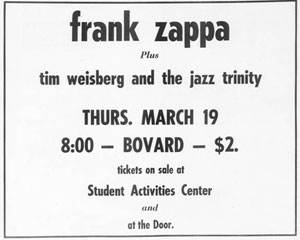
Chunga, formerly called Frank Zappa and the Hot Rats, will perform in Bovard Auditorium tonight at 8 p.m. Admission is $2.
The Hot Rats lasted approximately one week after the release of their album, "Frank Zappa and the Hot Rats."
[...] Chunga is composed of Zappa, Max Bennett, Ian Underwood and Sugar Cane Harris.
Bovard Auditorium seating capacity—1,500. [...]
On this campus, Bovard is the largest facility we can use, as long as the Drama Department, Opera, USC Symphony Orchestra, Trojan Chorale or Delta Kappa Alpha are not using it.
[...] As of this writing, Bovard has rats. Bovard does not have an adequate sound system, dressing facility, or lightning staff. For both the Festival of the Arts and the Zappa Concert, an outside lighting staff had to be hired. [...]
Also, in the defense of the Zappa Concert, the contract prohibited off-campus advertising until directly before the concert. (At which point advertisements were placed on three major campuses, three radio stations and the Hollywood area.)
May, 1970—The M.O.I. Reunion
[FZ] definitely plans to re-form his original Mothers of Invention for two concerts in the States. They appear at new York's Fillmore East on May 8—America's national Mother's Day. They also give a concert with a 100-piece orchestra at the University of California in Los Angeles on May 15. They will perform Zappa's ballet "200 Motels," described as a "love triangle involving a boy, a girl and an industrial vacuum cleaner."
Charles Ulrich, November 11, 2014
Jeff Simmons told me that it was up in the air briefly whether he would join Little Feat and Roy Estrada would go on the MOI reunion tour or vice versa.
Meanwhile rehearsals were going on for a big gig the Mothers were scheduled to have with Zubin Mehta and the L.A. Philharmonic out at UCLA. However I had been spending a lot of time with Don [Vliet] and the guys, so I wasn't making rehearsals. Herbie Cohen called and wondered where I'd been. I told him if Frank wanted to talk with me, he could call me. I was being a prick. Frank finally called. I told him I couldn't be in both bands, so I was going to start playing with Beefheart.
[He] tried to get The Mothers back together to do this thing with Zubin Mehta. It was actually part of the music that was in "200 Motels". Tried to get us back together and we . . . nobody in the band wanted to do it. No. The way he broke the band up turned everybody off to him. It wasn't a good move on his part, to do it the way he did it.
Sometime in early 1970, I got a call from Frank and he told me he wanted to put the band back together for a gig he was planning with Zubin Mehta and the Los Angeles Philharmonic Orchestra. We went and had a meeting with him and Herbie, but there were still some very bitter feelings about the way the band broke up. It was not so much from me because I'd still kept in contact with Frank most of the time. The band asked if Herb was involved and when Frank told us yes, everyone just stood up and walked out.
I didn't want to do it because Frank wanted to go out on tour and at that time Geronimo Black was going pretty good. I think Don was the only one from the final Mothers line-up who went back and did it. So did Billy Mundi and Ray Collins but they hadn't been in the band for ages. I was surprised to hear about Billy doing it because nobody had heard from him in ages and we didn't know where he was.
This band that's at the Fillmore now has been together for three weeks. We didn't play together before that time. [...] I was hoping that this Mother's Day tour would be beneficial to the merchandising of the film, because the merchandising of the film will help the members of the group because it will affect record sales, and then they can get their royalty.
[...] Actually it hasn't done that well, the tour itself, because for one thing we expected good crowds in Chicago, but the student strike blew that out of the box. We haven't been experiencing any immense overflow at the Fillmore East either. Wisconsin was good as usual. I don't know what's going to happen in Philadelphia.
I had the opportunity to do something I'd been wanting to do for about 15 years, which was to play with a symphony orchestra. They wouldn't play my music unless there was a rock group on the bill called the Mothers of Invention. But we didn't have a Mothers of Invention so what I did was put together various guys who had been in the Mothers in the past, not just from the last group. I went all the way back to the beginning. We did about a six day tour in the United States, went back to Los Angeles and played the Fillmore. When that was over, I disbanded the group.
May 5, 1970—Appleton
"'The Mothers' To Meet Cinderella," The Laurentian, May 1, 1970
Due to the responsive audience last spring, "Frank Zappa and the Mothers of Invention" have decided to include Appleton in their six city concert tour next week. The performance will take place next Tuesday, May 5 at 8:30 p.m. It will be held off-campus at the Cinderella Ball Room as Kenneth Byler, professor of music, refuses to move the orchestra rehearsal from Commencement ceremonies from the Chapel.
Starting in Appleton, "The Mothers," who have formed again solely for the tour, will give concerts in Chicago, Cincinnati, Philadelphia, New York, and conclude in Los Angeles on Mother's Day in a performance with the L.A. Philharmonic.
May 6, 1970—Chicago

May 15, 1970—UCLA
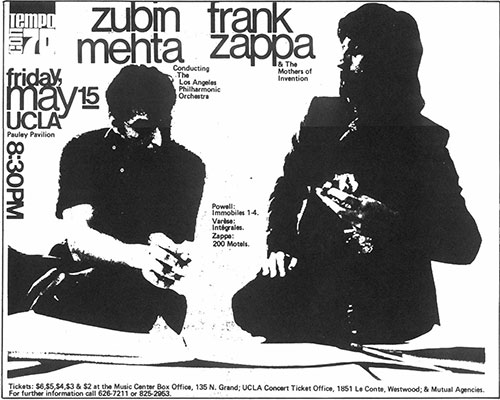
Bath, UK
[FZ] has been booked for next month's mammoth Bath Festival—and he's bringing some of the original Mothers over with him. [...]
Mothers coming with Zappa are Motorhead Sherwood (saxes), Ian Underwood (saxes and keyboards), Don Preston (keyboards) and Ray Collins (vocals). Completing Zappa's outfit is another new musician named Scalas.
Ray Collins
In the old Mothers, Ray Collins left three times and rejoined three times, which makes it pretty difficult when you have a repertoire built around the lead singer so that when leaves you have to revamp the book completely. Eventually I had to stop letting him back in.
Aha, The Attack Of The Green Slime Beast
Don Preston's Little Known Facts (now offline)
In 1970 Preston wrote and directed a performance art piece that featured Danny Devito and Meredith Monk. The name of the piece was "Attack Of The Green Slime Beast." To promote the play Danny and Don wore these big posters and walked around town. (Philadelphia) After turning a corner they found themselves in the middle of a huge St. Patrick's day parade. They got a lot of dirty looks.
In 1970, Tony moved to New York City, joined a band called Aha, the Attack of the Green Slime Beast, with Don Preston of The Mothers of Invention.
Tony Levin replying to Bill Lantz, May 7, 1996
Yes, that band I was in had Don Preston, Ray Collins, Billy Mundi and me. Don't remember who / whether anyone was playing guitar.
Tan Mitsugu, alt.fan.frank-zappa, January 17, 2003
According to his book "Beyond the Bass Clef", [Tony Levin] was a member of Don Preston's band called "Aha, The Attack Of The Green Slime Beast" in '70s. Their first gig was pretty ill-fated: There was no advertising (and no mention on the marquee of the venue) and they played before three people who wandered in. But even those three just ran away during the performance called "confronting the audience", which consisted of taped music, movie projection and "Don sitting cross-legged at the very front of the stage and glaring at the spectators while he was lit from beneath by an eerie flame produced by a small line of multicolored gunpowder on the floor" (quoted from page 6). Thus the band ceased to exist and each of them (including their dancers Meredith Monk and Danny DeVito) took their own course.
[FZ] was great, of course, but I never met him. The band I first joined in New York was all Mothers alumni—Don Preston, Ray Collins and Billy Mundi. Wild, indeed!
The New Mothers Of Invention—June, 1970
This group has been together for about four or five weeks. We rehearsed for about ten days before we went out on the road, and we've played San Antonio, Atlanta, a TV show in Holland, a festival in England, and then Ravinia. And that job last night [in Indianapolis] was our sixth job with that instrumentation.
The Phlorescent Leech & Eddie
Well, maybe you wonder as I did how Mark and Howard got involved with Zappa's comedy music. I suggested to them that the Turtles weren't anything like the Mothers. The answer was immediate and in unison.
"Oh yes they were".
Howard continued, "We had a lot of Top 40 records and we made a lot of National television appearances and because of the records we got into the television groove but when we did a concert we still had trouble with promoters because they thought the show was the grossest thing that they'd ever seen."
Mark Volman, who was perched precariously on the edge of a very flimsy table that threatened to crumble at any minute, went on.
"We moved to Hollywood in 1965 from about ten miles away but it was a big step. We were working at a club called the Red Velvet and Frank and The Mothers were playing a place called the Trip which was about half a mile up the street. We'd go and check them out at the Trip and they'd come down and see us.
"For us it was a natural progression from the Turtles to join the Mothers. We always knew we would be in the band because we had meetings even in the Turtles because the Turtles at the time in 1968 were going to sign with Frank's label, Bizarre."
Howard added, "We were going stale. We could have stayed together as the Turtles but we just decided to pack it in. When Frank said, 'Are you in? 'we said, 'yeah' immediately. It was very simple really.
Just before the Mothers broke up, we'd worked some gig where The Turtles were the opening act. We had a lot of laughs backstage with Howard Kaylan and Mark Volman, so it wasn't inconceivable that I could imagine going on the road with them. They had the 'road rat' mentality which you need in order to tour. No matter how good a player is, if he doesn't have that sense, he'll die out there. I've learned the hard way about a few guys that I thought could play the parts but they just weren't 'roadable'.
Mark Volman, quoted by Harvey Kubernik, Canyon Dreams. The Magic And The Music Of Laurel Canyon, 2009, p. 242-243
Herbie Cohen, Frank's manager, invited us to go to the UCLA show with Zubin Mehta in 1970. Herb was a second cousing of Howard Kaylan, my partner in The Turtles. [...] After the UCLA show, we were asked backstage. Frank then invited us that weekend to a barbeque at the Zappas' house. [...] Frank told us to bring our saxophones. He took us downstairs to the 'dungeon of horror' and played some music for Howard and me. He quickly saw that we were not sax players. He said, 'Look, we're going over to England for eight shows. How would you like to come along and sing?' We also did some U.S. shows and recorded with him for the first time a piece of music that came out on Chunga's Revenge. We did some other songs in the studio with Frank, including 'Rudy Wants to Buy Yez a Drink' and 'Would You Go All the Way?'
The night of the concert in Los Angeles, the two members of the Turtles who are now the lead singers with the present group, came up to me after the show and said how much they liked the orchestra thing.
The Turtles didn't exist anymore and they were out of work. I'd always admired the things they could do on stage because I'd seen the group several times and thought they were excellent on stage. So it occurred to me to try something with them. We weren't even going to call it the Mothers—we were talking about doing something else. But the easiest way to get a group off would have been to call it the Mothers. So we just put together another Mothers.
Well, if anything Mr. Zappa ever did could be said to be for monetary reasons, this is the only case where it's actually a fact. Frank was notoriously cheap, but what happened was The Turtles as a band had a whole bunch of hit records and they broke up after five and a half years while at the top of our form. Things were going great and we had just played at the White House. The only thing that was wrong was that we hated each other. We just hated each other. We had been together since before high school first as Crossfire and then as The Turtles, being corporate and kissing butt and being in court half of the time the band was together and long after we broke up. So there was no love loss between the band members at all. When we broke up we told the record company that we were no longer going to record for them because we didn't like the shit that they were giving us. So they didn't want us to record our own songs. So they locked the studio door on us with the equipment inside and got a restraining order and told us we could no longer use the name Turtles. They told me I couldn't use the name Howard. You can't go anywhere you can't do anything. So the group broke up, the label sued us, we counter sued them, we were in court for ten years, we couldn't use the names Mark and Howard to record.
The record company owned all of the masters, so we weren't getting any royalties after our demise, although they kept putting stuff out, repackaging and repackaging. We had done some demo recordings for a group that had not yet surfaced called Steely Dan. Donald (Fagen) didn't think he was a very good singer so Mark and I sang the demos that got them their deal at ABC Paramount, Dunhill. So they asked if we wanted to sing lead in Steely Dan, but that didn't make any sense, we didn't have the jazz background and it wasn't our kind of songs so we just said no. We were also offered to play the leads in the L.A. production of the Broadway play "Hair" but that would have sent us down the wrong road. We were truly despondent. But it was only two and a half weeks between the time our lawyer told us that we were stupid and we say Frank Zappa play with the original reunited Mothers of Invention along with the L.A. Philharmonic at UCLA. We loved it, and after the show we went back to tell Frank we loved it. We had known him all our lives and known his manager Kirk even longer.
And he said hey, I hear The Turtles broke up, and we said yeah, and he said 'Do you wanna be in The Mothers?' He said 'I'm making a movie, we're going to Europe and we're playing this big Bath festival. He said 'come over to house on Sunday, we're having a barbeque and bring your saxophones.' We were elated. We were beside ourselves. We didn't know what to do but we did know two things, first, that we were crap sax players, and we also knew that he has Ian Underwood with him and Ian was an incredible sax player. But we played along. We went to the barbeque and we took our saxes. He asked us to play what we knew, so we kind of honked along a little and then he looked at us and said, no, why don't you sing along. So we did, and it was an instant thing. He said yeah, that;s what i want. We were a little apprehensive in joining the band because we knew it would be perceived by Frank's audience as a real sell out kind of move. We had a ball though and it lasted for three years until Frank's horrible accident at the Rainbow Theater, the fire in Montreux where everything burned to the ground, "Smoke On The Water," and after many tours and the movie "200 Motels" I think it worked out well.
Why don't you play saxes in this band?
Haven't you figured it out yet? We did once. We have. We don't like to. Not only that, it's another thing to lug around on the road, and when you're just schlepping at one or two songs and Ian [Underwood]'s better at it and can make himself sound like 50 of us, then you say: "Listen, Frank, I'm bringing my guitar, so I can write in my room, and I'm bringing my suitcase and maybe a tape recorder so I can get out of it and Moody Blues into the cosmos until the early hours of the morning. Otherwise, why bother?
Howard Kaylan, interviewed by Cody Conard, Neotomic Aliviac, April 9, 2009
When the Turtles broke up, we went to see Zappa performing at UCLA with the LA Philharmonic. Backstage, Frank told us that he knew our band had broken apart and asked if we were interested in becoming Mothers of Invention. Since our only other option was to join the LA cast of "Hair" as Claude and Wolf (honest!), we opted for the Mothers.
Our record company lawsuit forbade us from using our real names or the name Turtles, so we invented the Phlorescent Leech and Eddie (after 2 ex-Turtle roadies), Frank loved it and we kept it.
The new members, according to Don Preston, brought other changes to the band as well. "Mark and Howard wanted everything to be very set. They had to have a set list. They had to know exactly what was going to happen, and they didn't want any surprises."
George Duke
After [the Los Angeles Philharmonic Orchestra concert], Frank asked me to join the band. I couldn't understand why he wanted me, because I was such a straight-laced jazz player. But he liked me because I was crazy. I would do anything on the piano. It's funny. The music we did with Jean-Luc Ponty on that record, and the stuff we did with Zubin Mehta, was advanced for the time; it's probably still advanced for now. But when I joined the Mothers, the first stuff we did was that kind of rock and roll where you do those doo-wop triplets. I was like, "Oh, God! I can't do this!" After that, of course, we moved right into the more advanced music.
The first recording I did with him was one cut on Chunga's Revenge, but that was more of a studio date.
[...] But you know, when I was first in the band, I didn't play a lot of keyboards. That was Ian Underwood. I played mostly trombone. He found out I played trombone and I realized, why did I tell him that? When I rejoined [in 1973], I said, "I'll rejoin this band on one condition: I will not even look at that trombone!"
[Save The Country (1970)] was my first solo album for an American Record Company. [...] The LP was recorded, I believe, during the Spring of 1970 while I was touring with Frank Zappa. His influence is certainly felt in this album. [...]
July 25, 1970—Riviera Festival—Valbonne, Antibes, France
Rock & Folk #44, September, 1970, p. 42-43
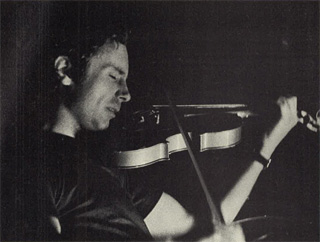
Valbonne, ou le premier en date des festivals interdits sur la côte. Peut-être l'ambiance la plus sympathique, en tout cas un nombre réduit de participants. Devant les difficultés financières de l'organisation, Jean-Luc Ponty et Frank Zappa refusèrent de toucher leur cachet.
Google Translate:
Valbonne, or the first of the festivals prohibited on the coast. Perhaps the friendliest atmosphere, at least a reduced number of participants. Faced with the organization's financial difficulties, Jean-Luc Ponty and Frank Zappa refused to touch their fees.
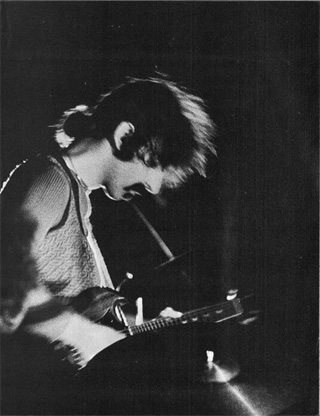
[Photos by Jean-Pierre Leloir]
The Valbonne festival was organised by Claude Rousseau, who had organised the Bourget festival (near Paris) the previous March.
The programme, as announced in late June, was as follows:
July 23rd: Iron Butterfly, Warm Dust, Swegas & Moving Gelatine Plates
July 24th: Gong, Brigitte Fontaine, Amon Duul II & Red Noise
July 25th: Zappa/Ponty, King Harvest & Ame Son
It seemed like it was going to be a great Summer for
lovers of rock music, with no less than three major festivals announced
in the South of France for late July and early August: in addition to
Valbonne, there was another one in Aix-en-Provence on August 1st-3rd,
organised by trendy fashion designer Jean Bouquin, as well as the
follow-up to the 1969 Amougies festival by Jean Karakos, in Biot,
beginning on August 5th.
However, around mid July it all went wrong: all three
festivals were banned by the authorities, who used the risk of forest
fires as an excuse. In the event, they did go ahead, but in this
pre-Internet age lack of reliable information ensured that attendance
was well below expectations, and that the promoters lost a lot of
money. Many bands weren't paid or refused to play, and in the case of
Biot the event ended prematurely, degenerating into a riot.
The Zappa/Ponty jam was expected to be the highlight of
Valbonne. However it didn't turn out quite as planned either. According
to Ponty, Zappa was supposed to come with the new incarnation of the
Mothers of Invention, but turned up on his own, Amougies-style! A
pick-up band had to be assembled at short notice, and the duo ended up
sharing the stage with two noted French jazz players, drummer Aldo
Romano and bassist Alby Cullaz.
August 27, 1970—Thee Club, LA
Robert Hilburn, "New Rock Outlet Opens Its Doors," Los Angeles Times, August 29, 1970
Thursday [August 27, 1970], a few blocks down Santa Monica Blvd., Marshall Brevetz, the round, Buddha-shaped owner of the new Thee Club, was hosting some 600 friends in a preview of his new rock facility.
[...] As the owner of Thee Experience rock club on Sunset Blvd. for nearly a year (it closed last January), he made a lot of friends. He built a good reputation among both musicians and customers.
[...] But the sound system hadn't been completed in time for a full sound check so Frank Zappa & the Mothers of Invention, who had agreed to play at the preview, didn't perform. Brevetz didn't want to use the sound system until it was fully checked. Nothing gives a club a bad reputation in the music industry as fast as bad sound.
In the early 70's [I] fronted the group Crabby Appleton. [...] We opened Thee Experience sandwiched between Captain Beefheart and Frank Zappa. What a night that was. I knew Zappa's humor and was fairly familiar with his recordings—but I had NO IDEA what an incredible guitarist he was until that night. That band was probably more like Prince's New Power Generation than any I've seen before or since. They switched time signatures at Frank's whim and hand signals . . .
Charles Ulrich, September 27, 2013
Crabby Appleton guitarist Michael Fennelly [...] remembered the gig at which they opened for FZ. He said it was not at Thee Experience, but rather at the grand opening of Thee Club, which Marshall Brevetz opened sometime after Thee Experience closed. He remembered Beefheart doing his own set, not singing with FZ.
October 8-25, 1970—US East Coast
October 10, 1970—Sports Stadium, Orlando, FL
Central Florida Future, October 2, 1970
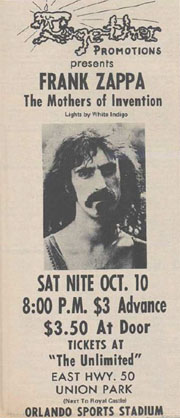
Stetson University Yearbook 1971, p. 201
Ecoustically, the Orlando Sports Stadium leaves much to be desired, but when James Brown, The Mothers of Invention and the Chambers Brothers were featured in Stetson's fall concert program, people were little bothered by the resounding vibrations of the metal roof. [...] Led by shirtless Frankie Zappa, The Mothers appeared in October playing in their unique style. Ushers patrolled the fire aisles, extinguishing cigarettes and grabbing incense as though it were a "new-type drug". The Mothers finished their gig with a twenty-five minute instrumental.
October 19, 1970—Clark University, Worcester, MA
I can remember [...] in Worcester at Clark U when the band had big time plane problems, so Frank taught the crowd the routine about "..com-part-ment.." (being the storage above the seats the airline was so pissed off over) complete with hand signals. J Geils opened for them, and did more then one 'Full House Live' show waiting for FZ/etc.
[...] FZ spent over 45 mins explaining to the crowd, and then teaching them the hand signals. Clark U, in the entrance, they pushed all the seats aside, and J Geils Band opened. FZ(et all) were delayed in Boston so long, the JG Band did at least 3 sets of the live Full House show. till the band showed up. I lifted at least 10 of those blue/white ARB cabs helping to get the show on.
Probably the most unforgettable Clark concert for me was one of the very first ones I attended, in the fall semester of 1970: The Mothers of Invention in the basement of Jonas Clark Hall (aka “The Women’s Gym”), with the J. Geils Band as the opening act. I’d never heard of the J. Geils Band before that, and I remember they announced at the show that their first album had just been released, or maybe it was that it was just about to be released. In any case, I was blown away by them. The venue might have been a dark, musty old basement broken up by a maze of support columns, but they played with the same intensity that they did in subsequent years at major concert venues: pedal-to-the-metal, giving it everything they had. I became an instant fan. As for The Mothers, this was my first exposure to Frank Zappa and company, and although I think the band that he was to put together in another three years or so was superior to this one, they were still very good. I remember Flo and Eddie—the lead singers, formerly of the Turtles—getting into a routine where they were making fun of the accents of the Boston-based flight attendants (guess they were actually “stewardesses” back then) on a flight into Boston: “Please place your bags in the overhead comPAHHHHHTments.”
October 24, 1970—Fieldhouse, Beloit College, Beloit, WI
I have to put out another Mothers album prior to the release of the 200 Motels album because that won't come out until next Christmas. It's probably going to be a live thing. I've recorded a concert in Beloit which really turned out groovy.
c. October, 1970—Darmouth College, Hanover, NH
David N. Dunkle, "Natural Impressions," The Patriot News, January 11, 2007
[Moses] Pendleton was a student at Dartmouth College, and Zappa and his group, the Mothers of Invention, were performing a concert at the Ivy League school. Zappa was so taken with the weird performance of Pendleton and some fellow students before his concert that he invited them to come along on tour.
They had to decline. "We told him we had midterms coming up," Pendleton said.
But the encouragement emboldened Pendleton to pursue a career in dance. He also remained friends with Zappa until the musician's death in 1993.
Francis Ma, "'Momix' director draws on energy of the '60s," Daily News Tribune, January 16, 2008
Later on in Dartmouth, [Moses Pendleton] experimented more, trying to do things with natural light and forming unnatural shapes with just the use of shadows. They were so impressive that Pendleton and his friends were asked to open a Frank Zappa concert.
"Zappa called us 'far out theater' and wanted us to tour with him," recalls Pendleton. "We told him we had math exams. But it was a very formative experience and showed us that there was an audience for what we were doing."
This led to the creation of the Pilobolus Dance Company (which he co-founded) in 1971.
November 13-14, 1970—Fillmore East, NYC, NY
Joni Mitchell sat in with us last night during the second show and we improvised a thing that was really good. And we ended it with her singing "Duke Of Earl." Really far out, she came on stage: "Now OK and we're going to improvise this thing . . . " and we did a few chords for her and she started reciting this poem which began: "Penelope wants to fuck the sea . . . " And the audience did a double-take "Yuuunk!" . . . a little hush falls over the Fillmore . . . JONI MITCHELL ?!!
November 19, 1970—Fountain Street Church, Grand Rapids, MI
Frank Zappa requested that a string quartet perform before his band. His request was granted by the Grand Rapids Youth Quartet, composed of John Sullivan, Leo Najar, David Burhenn and Kristine Mulder.
After Zappa's first set Carolyn asked him to refrain from repeating a song with sexual lyrics during the next show, and he complied by playing a completely instrumental set for the late concert.
Carolyn recalls that Zappa was reluctant to attend a reception at her home after the concert, but he complied when she offered to play the recordings of his concert for him.
Pianist and singer Kathi Swets, who is a friend of Carolyn Heines, also attended the party at Carolyn's home. She had just finished her club date for that evening. A Zappa tune named King Kong was on the stereo, and Kathi recognized the tune by name. Frank Zappa was surprised that she knew his music that well.
Keith Oberfeld, a member of Fountain Club, recorded most of the Fountain Street Church rock concerts. He recalls that there were other teenagers who helped him, including Steve Crandal. It was typical for musicians who performed at these concerts to come to Carolyn's home after the shows to listen to these tapes.



